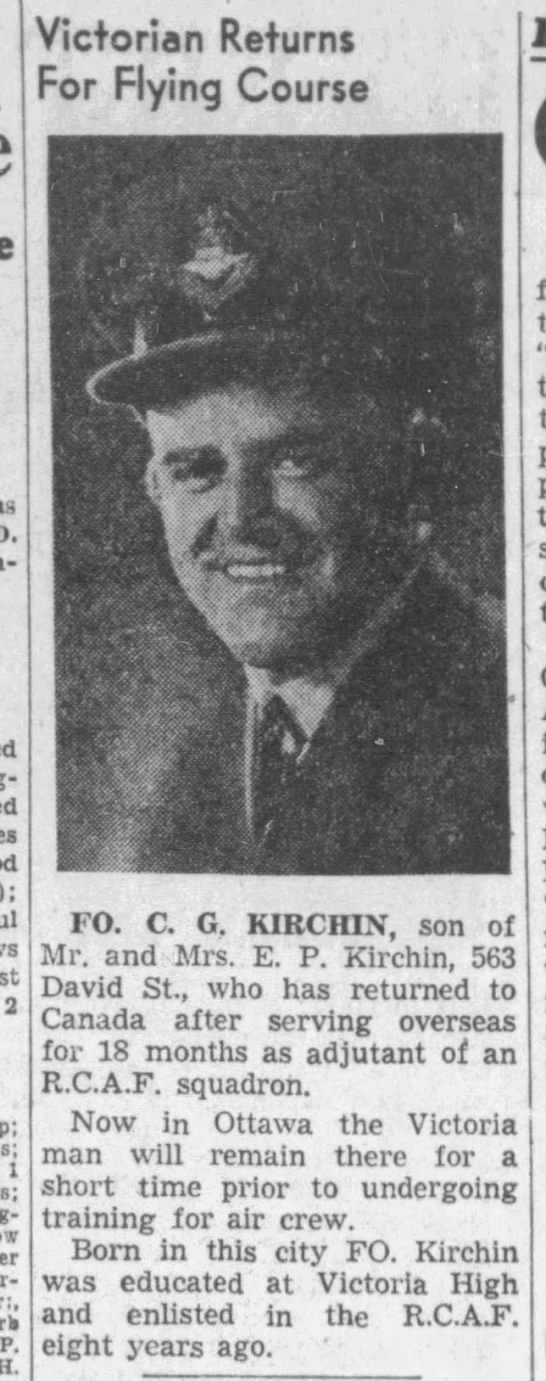
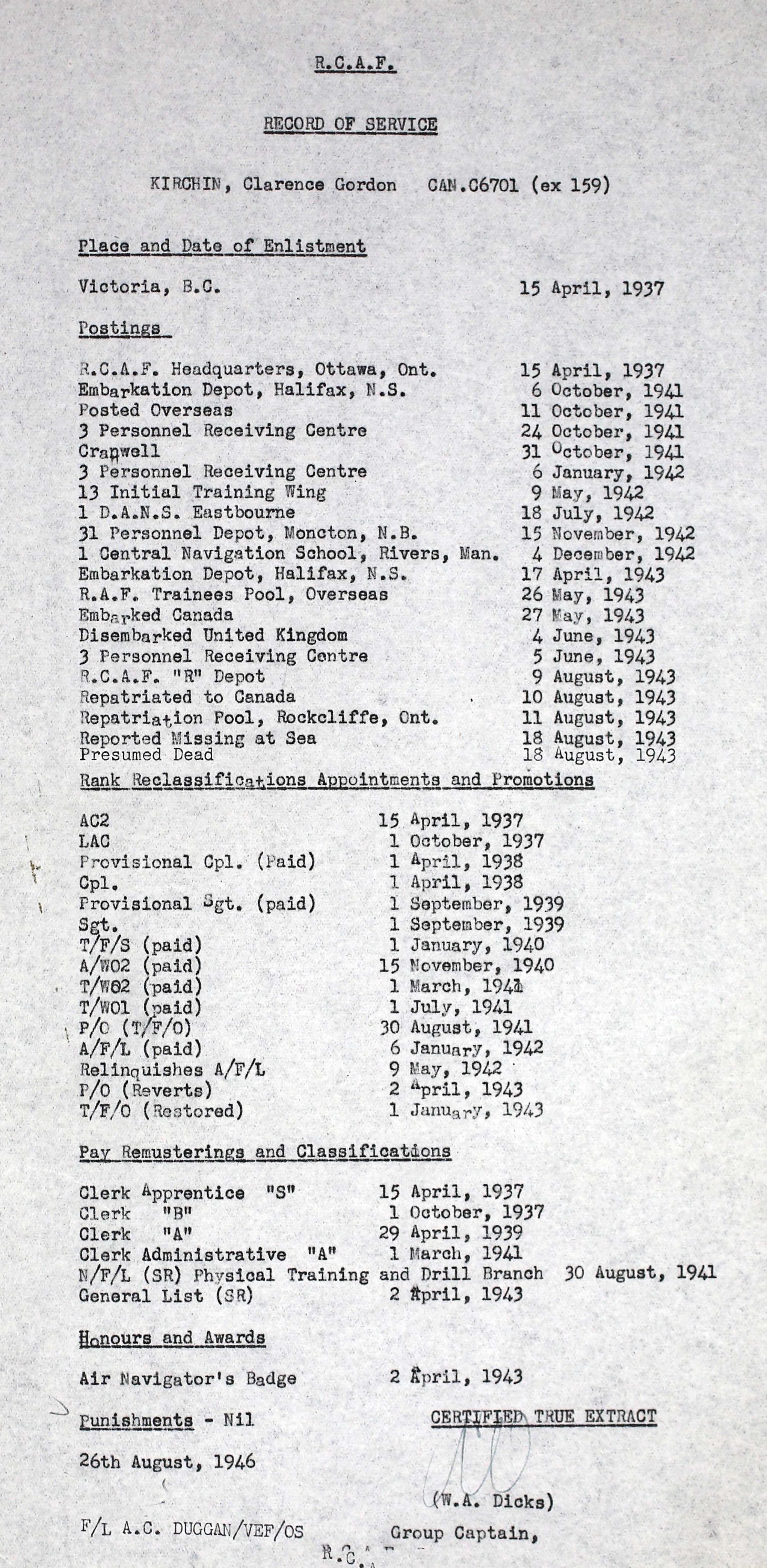
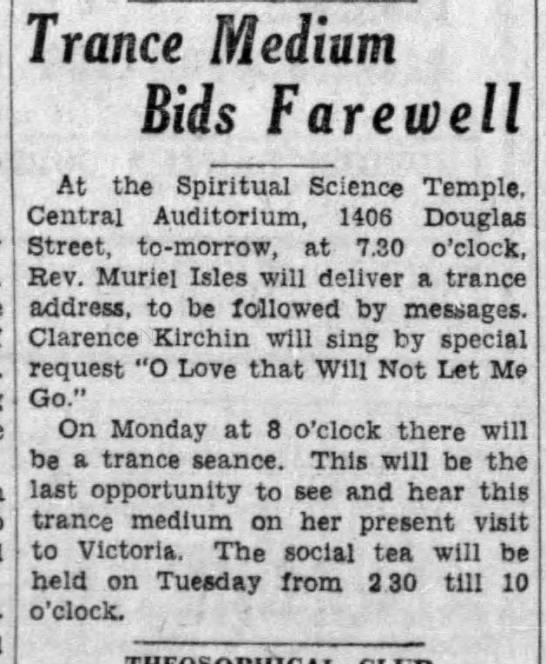
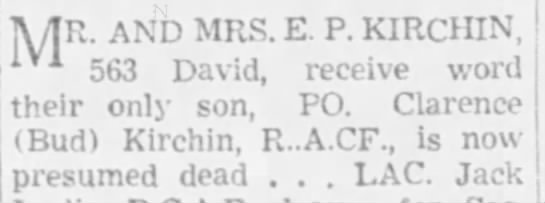
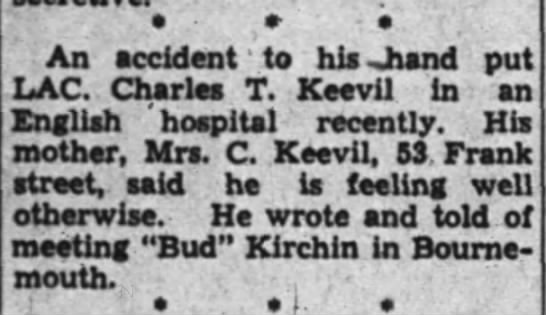
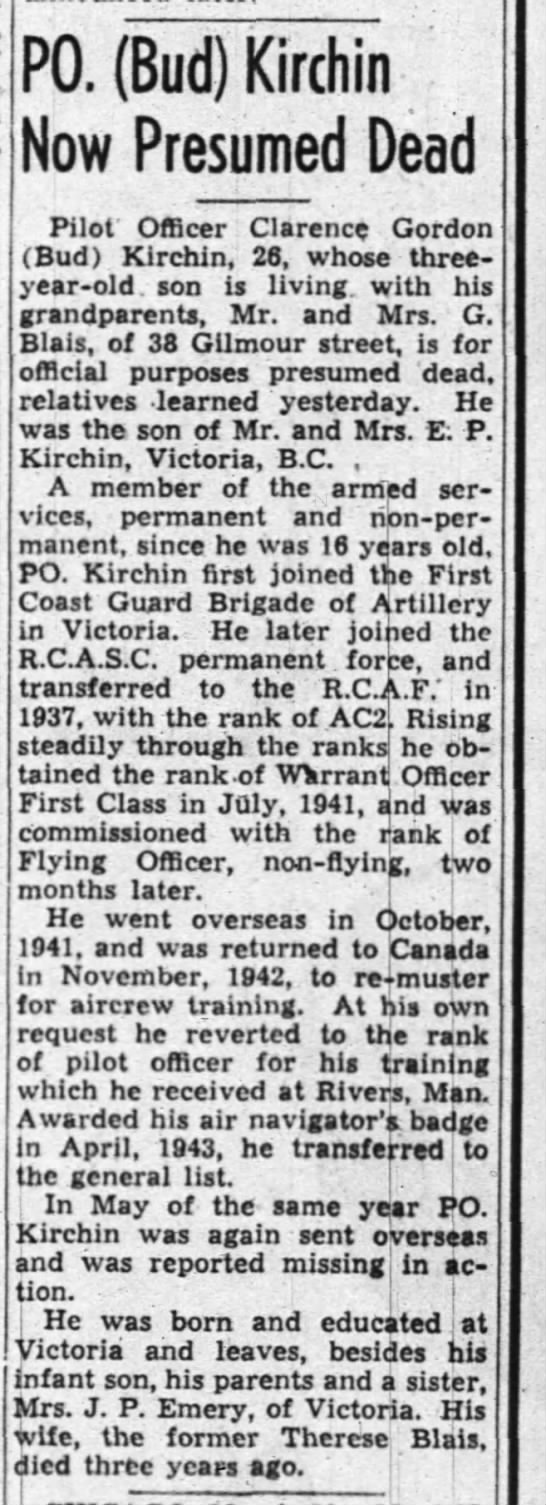
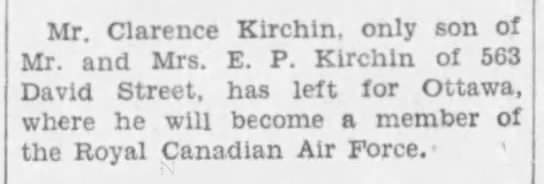
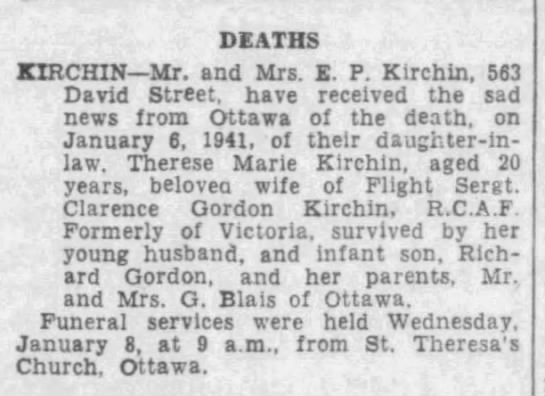
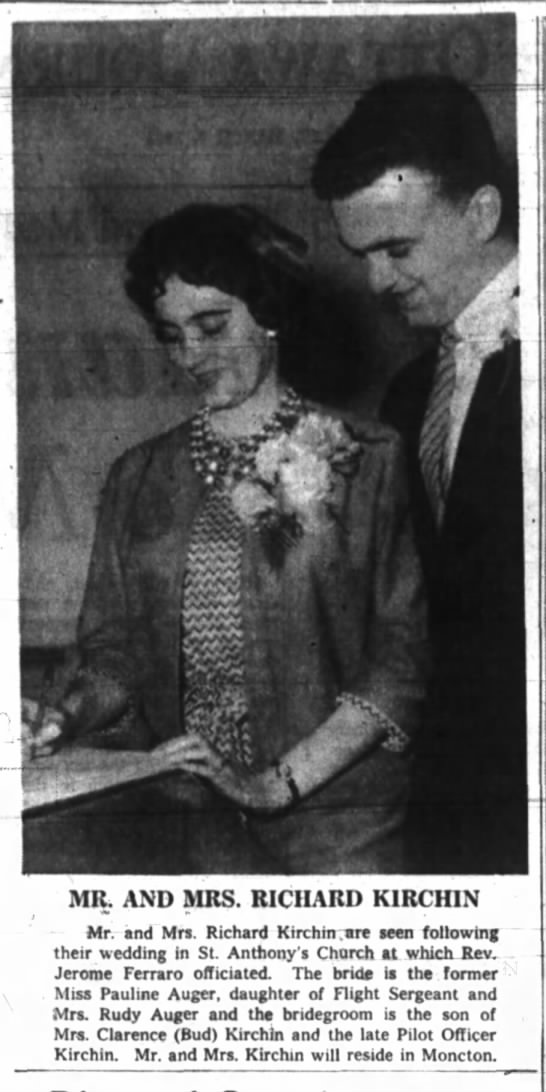
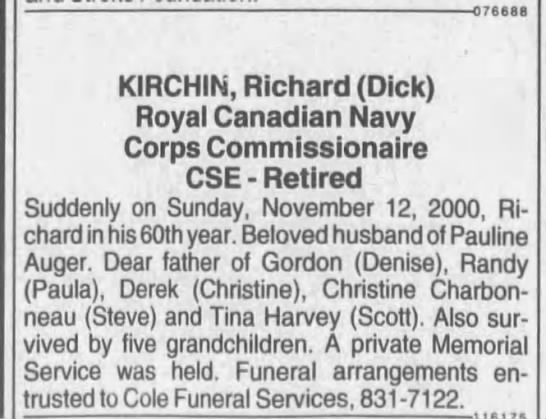
July 6, 1915 - August 18, 1943










Clarence ‘Bud’ Gordon Kirchin was Roman Catholic. He was the son of Evelyn Page, conductor, BC Electric Railroad, and Isabella/Mary Belle (nee Proctor) Kirchin of Victoria, BC. He had one older sister, Patricia.
He attended school in Victoria, where he received a Business Diploma in 1933 from Victoria High School. He attended Ottawa Technical School at night between 1937-1938 studying Auto Ignition, and then attended St. Patrick’s College at night in 1939 studying mathematics.
His interests included judo-wrestling, swimming and general PT work (extensively), tennis and skiing. He liked music, singing, boating, and hiking.
He had previous military experience. From March 1932 to September 1933, he was a member of the 5th BC Coast Brigade as a L/Bombardier with duties of Range Finder.
He moved to Calgary and was at the Royal School of Army Service Corps from January to April 1937. From then he was part of the RCASC as an L/Cpl, with duties of orderly room and pay NCO until April 1937. “Hard working, reliable, painstaking and accurate in his work. Very good at typing and shorthand. Fair knowledge of bookkeeping. Trustworthy and of good habits. Would make a good junior clerk in any firm.” He was given an exemplary rating on his conduct and character.
He joined the RCAF in April 1937 with the rank of WO 1, administrative duties until the end of August 1941. During that time, he took an Airman Pilot’s Course in Trenton from July to December 1939. He completed an aeronautics Ground Course and Flying training was terminated owing to slow development of air sense.
During his medical examination, his visual acuity was 20/20 but there was slight exophoria, where eyes drift outward or one eye drifts away from the other.
He had hazel eyes, light brown hair, stood 5 4½” tall and weighed 139 pounds. There was some evidence of tuberculosis of the lungs, present or past absent in April 1937.
Assessment on February 16, 1938: "This applicant appears bright and co-operative during examination. No apparent nervousness. Consider applicant fit for flying duties."
He was a member of the YMCA and Ottawa Boys Club. He was a wrestling instructor at various clubs in Victoria and then in Ottawa.
On December 30, 1939, he married Marie-Therese Lucille Blais, daughter of Godfrey and Regina Blais of Ottawa. Charles Keevil was the best man and Therese’s cousin, Lorraine Charron, was maid of honour.
At the age of 20, Therese died due to complications of childbirth (eclampsia/toxaemia of pregnancy) at the Grace Hospital in Ottawa, on January 6, 1941, one day after their son, Richard Gordon, was born. Therese’s parents in Ottawa raised Richard. When Bud wrote his will, he left $100 for each of his own parents with the remainder to go into trust for his son, in care of Mrs. Regina Blais.
Kirchin worked as a clerk for the RCAF from April 15, 1937 to March 1, 1941, posted overseas October 11, 1941 until November 1942, when he returned to Canada for training as a navigator in Rivers, Manitoba. From March 1941 to August 1941, he was part of the Physical Training and Drill Branch. He was awarded his Air Navigator’s Badge on April 2, 1943. He visited his parents during his leave before heading overseas.
He was back in Halifax by April 17, 1943, then left for the United Kingdom May 27, 1943, arriving on June 4, 1943, but it was deemed necessary to repatriate him to Canada on August 10, 1943. June 11, 1943: “This officer is so wrought up, he is unable to tell a complete and coherent story. He is unfit to be remustered. He is worried about his kit, his past life, etc. He has not been sleeping well for the last month due to this worry. He sits, running his hands through his hair and grinding his teeth. Not to be left alone.” “This officer is in a state of agitated melancholia. He says he cannot think or act clearly, has difficulty sleeping an worries about everything. He is full of self-reproach which is apparently without foundation and much of which is obviously absurd. Physical examination shows badly bitten nails, tremors of his fingers, tongue, and facial muscles, and the distraught appearance. He should be admitted as soon as possible to the Canadian Neuropsychiatric unit at Basingstoke and meanwhile must be kept under supervision as a potential suicide case.” Colin Edwards, S/Ldr.
Later that month, June 25/43: “COMPLAINT: ‘The whole thing is mixed up. I can’t get anything organized. It’s been going on for a long time.’ PAST HEALTH: convulsions in infancy, he does not remember, but his mother told him that he had repeated convulsions until five or six years of age. Child fever but not severe. PERSONAL HISTORY: Born in Victoria, British Columbia and lived there until enlistment. Home life satisfactory in childhood. Father was a gardener. States that he was a nervous child, was a nail biter, had frequent nightmares, winning and was afraid of the dark. Was quite shy at school, but an average student and active in sports. Finished three-year course of commercial high school at age 17. He was in the NPAM at 15 and at age 17 enlisted in the RCASC, PF. Service 3 ½ years doing clerical work, rank of Lance Cpl. Then in 1937 he transferred to the RCAF as a headquarter clerk. Went on a flying course in 1938 but failed and was considered unsocial. He failed in the actual flying after making several bad landings. He went back to clerical work. He was promoted to W01 in 1941 in administrative work. Was commissioned in P T and drill branch in August 1941. Came overseas in September 1941. In Bournemouth, was engaged partly at PT and drill, partly administrative duties. He remustered to aircrew in May 1942. Did fairly well at initial training course then passed the elementary navigator's course. Returned to Canada November 1942 to finish navigation training. Passed that but with some difficulty. Returned to England as navigator one week ago. Married in 1939 after being engaged six months. Was quite happily married and very upset of his wife’s death in 1940. Is now engaged to his wife’s cousin. He speaks of that hesitantly and doubtfully. Smokes and drinks moderately. Moderate religious devotion. PERSONALITY AND PRESENT CONDITION: He states that he has always been nervous but it is difficult to get any amplification or explanation of that even with direct questions. Confusion and slowness of thought makes it impossible for any complete history. He speaks of his nightmares and nail-biting in childhood. The latter has persisted. He has always been shy and seclusive. He cannot date the onset of his present state. He states that his nervousness just kept on growing. During his navigation course in Canada, he found the studying very hard and believes he became more nervous then. About two weeks ago aboard ship, he suddenly realized that his kit was not complete, and he had been worrying about that a great deal ever since. Apparently he refers to the fact that he only had kit bags instead of proper luggage. He worried about this a great deal, though he cannot explain any adequate reason. He has not suffered any bodily symptoms of ill health. To further direct questioning, he states that he has been sleeping and eating poorly. Says he has been feeling sad for some time about things in general. Denies any suicidal ideas. EXAMINATION: A short stocky young man who appears in good physical health. Mental state: he is clean and tidy in appearance, but is very apathetic... The ward sister reports that he is very quiet, sits alone in the lounge and seldom talks to the other patients. When encouraged, he will go for walks and read magazines, but his interest seems superficial. At times he seems tense and easily startled, walking about restlessly biting his nails. He has shown no evidence of any depression, or any suicidal tendencies. His face and talk suggests blankness; at times bewilderment and confusion. There was very little continuity of speech, and when interviewed he can be coaxed into saying only a few hesitant words and phrases. Usually when asked a question there was a long pause, often several minutes, in which he seems a little tense; embarrassed. Eventually may answer any questions with an indecisive brief phrase. His speech suggests of pronounced thought blocking, indecisiveness and confusion. At times he talks in a mildly self-accusatory way without much show of emotion. He seems distinctly shallow, effectively at times, he is normally oriented but his memory is a little hazy for the past events. His native intellect appears to be average or above as far as it can be estimated. No evidence of hallucinations or delusions. CRANIAL NERVES: normal. Motor functions, sensation, reflexes. General physical exam shows no significant abnormalities. There is a short mental systolic murmur, no cardiac enlargements. PROB. DIAGNOSIS: schizophrenia. June 25 1943: has remained very inclusive and withdrawn at times becoming more confused and agitated. Because of the short history of depression, he might benefit greatly from by shock therapy soon. For that reason he is being transferred to Shenley, so the decision as to giving him much treatment will rest with the medical officers there. FINAL DIAGNOSIS: Schizophrenia." Lt. Col. J. C. Richardson, Basingstoke Neurological & Plastic Surgery Hospital, RCAMC
Bud was reported missing on August 18, 1943 at sea, whilst enroute to Canada aboard the hospital ship “Atlantis” as he was being repatriated on medical grounds, owing to his mental condition.
A letter, dated November 10, 1943, addressed to Godfrey Blais: "Some additional information has now been obtained about the regrettable case of your son-in-law, Pilot Officer Clarence Gordon Kirchin. Following completion of his training in this country as an air navigator, your son-in-law and barked at Halifax on May 28, 1943 and arrive in England on June 4, 1943. During the voyage uncommon symptoms of mental disturbance developed, and he was given medical care in England immediately his condition became apparent. On June 21, 1943, he was examined by a Board of Medical Officers at Basingstoke, Neuro and Plastic Surgery Hospital, RCAMC, in England and his condition was diagnosed as schizophrenia, a mental illness that appears to have been accompanied, in your son-in-law’s case, by tendency to excessive worry. It was then decided to return your son-in-law to Canada for further hospitalization and treatment, and he was, accordingly, taken into the military hospital at Shenley, Herts, with the opportunity to return home, and on or about August 10, he was embarked on the hospital ship “Atlantis” from which he disappeared on the night of August 18 and the circumstances related to you in a previous letter. I would like to express to you again my very deep sympathy for the loss of your son-in-law. He had a long and credible record of service and the Royal Canadian Air Force and showed himself at all times anxious to be engaged in the field where his talents would be of the most used to the Force. We have the best interests of the Force always at heart and his loss in the service of his country is to be deeply regretted.
A Court of Inquiry was struck aboard the hospital ship Atlantis on August 19, 1943 to investigate Kirchin’s disappearance.
The first witness, Mr. H. Sang, Chief Officer, stated, “Roughly at 22:45 hours, I was informed by one of the medical staff that a patient was missing from one of the wards. I instituted a search of the crew’s quarters and all decks, but no trace of the missing patient was found.”
The second witness, Major R. Cotter, RAMC, Officer D.3 Ward stated, “That at about 20:45 hours, I have the occasion to go along to D. 3 Ward. I was not quite satisfied the escorts were fully alive to their duties at that time and I sent for the NCO in charge of the ward. I issued instructions for the better ordering of the guard and took steps to ensure that their duties were fully understood. All patients for reporting present and correct at 2100 hrs. At 2245 hrs., it was reported to 45 hours, it was reported to me that one of the patients was missing. Pilot Officer Kirchin RCAF. I saw that a thorough search had been made and was still being made for the patient and in consideration with the diagnosis of the patient, when I was practically satisfy that he had gone overboard, I sent for the orderly NCO to reports the commanding officer. On investigation from the orderlies on duty, there is a feasible explanation as to how this patient went missing which will be given in direct evidence from the witnesses themselves. This officer was embarked with the diagnosis of schizophrenia with which I agreed. He had been perfectly well behaved during the voyage. His medical notes, prior to embarkation, contained a statement to the effect that he had shown no depression or evidence of suicidal tendencies.
The third witness, L/Cpl H, Weatherhead, senior orderly of D. 3 Ward, day duty, stated, “yesterday evening I went off duty at 8 o’clock. At 8:45, I was sent for by Maj. Kocher to assist with some treatment. After this I was told to remain on duty inside the ward, and private tab was put on duty on the desk just outside the war percent of the patients were. At about 10:25 the patients are being brought in from the deck and it was discovered P/O Kirchin was missing. I told Pte Kebb to have another look around the deck and if he still couldn’t find the patient to report the matter to Major Cotter. Patients were going in and out of the ward between the time when Major Cotter and the time when the patients are finally brought in by private Tebb. P/O Kirchin was not one of these patients. The last time I saw P/O Kirchin was at 8:50, when he was sitting outside on the deck. There were no guards posted on the landing to the companionway outside the ward.
The fourth witness, Pte. C. Tebb, orderly on night duty D.3 Ward stated, “I was one of the orderlies on night duty in D. 3 Ward beginning at 8 PM. When I came on duty P/O Kirchin was in the ward. I was posted on the starboard side of the deck at 9 o’clock. I saw him walk across the port side of the deck in about 9:50 minutes to the door leading to the companionway out side the ward. I did not see him actually enter the ward. At 10:25, when the patients were checked up for bed, he was found to be missing.
The fifth witness, Cpl Walter C. Hunt, 36 Hospital US Army Medical Corps stated, “I was on night duty on D.3 Ward beginning at 8 o’clock yesterday evening. P/O Kirchin was on deck outside the ward when I came on duty. At approximately 9:45, I saw him walk around from the portside to the starboard side of the deck. I knew Pte. Tebb was on duty on the starboard side of the deck. I did not see P/O Kirchin again, and asked about twenty five past ten, he was found to be missing. I spoke to him several times after I came on duty and he appeared quite rational and friendly.
"There are no other witnesses to throw any further light on the master, and the court is informed that no trace of P/O Kirchin has been found up to the time of writing at 1130 hours. The court having considered the evidence concludes that he instead of entering the ward at about 2145 hrs. When he was seeing to leave the deck by the orderlies on duty then went to another part of the ship by the companionway just outside D.3 Ward. As no trace has been seen of him since, the court resumes that the patient disappeared overboard. It is the opinion of the court that had been an orderly been stationed by the companionway in addition to the two orderlies on deck, this regrettable occurrence could have been averted. In order to avoid in the future the repetition of these regrettable events, precautions should be immediately taken in the way of increasing the number of guards, more skillful guards, and even iron gates be installed for the protection of these mentally irresponsible patients." Major G. Gill, RCAMC
Letter September 3, 1943: "He was moved from Shenley Military Hospital to No. 1 Cdn Neurological Hospital, with medical escort under Major D. W. Porter on August 6, 1943, where he remained until August 9, 1943 when he was moved to the hospital train under medical escort provided by the hospital. On board the train he was under supervision of Major J. E. Burch, Neuropsychiatrist from No. 1 Neurological Hospital, to port and was embarked on the hospital ship Atlantis, still under medical escort. He had embarkation classification label marked with diagnosis schizophrenia and classification of walking mental case. In addition he had a British label marked for hospital case PP, which is what the recognize abbreviation use on hospital ships for psychiatric cases."